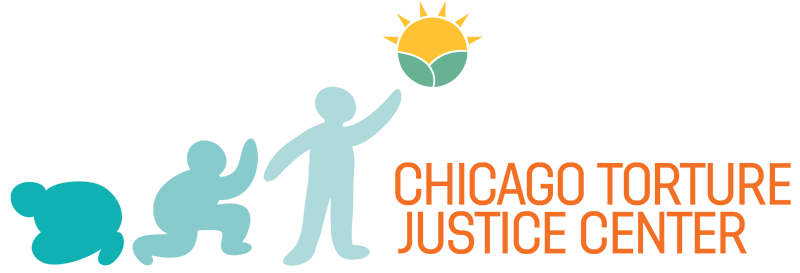Words from Reginald Henderson
Reginald Henderson wrote this statement ahead of an upcoming hearing for his petition for Certificate of Innocence. Reginald Henderson and his brother Sean Tyler are survivors who were targeted and tortured by Chicago police in 1994. They were incarcerated for over two decades as a result, and were finally exonerated in 2021. They are still awaiting their Certificates of Innocence, which the State’s Attorney’s Office have withheld with little explanation. The hearing takes place on Wednesday, May 24, 2023 at 9am in room 101 of the Cook County Courthouse (2600 S. California). We call on our community to show up in court to support Sean Tyler and Reginald Henderson.
Ladies and gentlemen,
Reginald Henderson (left) and Sean Tyler (right) stand with their supporters while speaking to the press.
I stand before you today to share a story of injustice, a story of two African-American men who were wrongfully imprisoned for a crime they did not commit. One was locked up from the age of 18 to 45, and the other was imprisoned at the age of 17 and was released after 42 years. This is a story that highlights the devastating consequences of wrongful imprisonment and the psychological and neurological effects it can have on innocent men.
The trauma of wrongful imprisonment is a real and pressing issue that we need to address as a society. Studies show that those who are wrongfully imprisoned suffer from a range of psychological and neurological issues, including anxiety, depression, post-traumatic stress disorder (PTSD), (PIS )and even brain damage from prolonged periods of isolation.
But the trauma of wrongful imprisonment does not end when a person is released from prison. In fact, studies show that the trauma can continue for years, even decades, after a person has been released. This trauma can make it difficult for people to reintegrate into society, find employment, or even form meaningful relationships.
Moreover, the statistics on reacclimation and recidivism paint a bleak picture. According to the National Registry of Exonerations, over 2,800 people have been exonerated since 1989. Of those, 1,639 were African-American men. And while exoneration is a critical step towards justice, it does not undo the harm that has been done. In fact, many people who are wrongfully imprisoned struggle to adjust to life outside of prison, leading to a higher rate of recidivism.
The trauma of wrongful imprisonment is compounded by the fact that many of those who are wrongfully imprisoned come from disadvantaged communities. As was the case with my brother and I we were raised in the impoverished community of Chicago's Inglewood during the crack epidemic. We were raised in a single parent household by an African American woman, trying to make ends meet. This is a story that is all too familiar in our society, where people of color are disproportionately impacted by poverty, lack of access to education, and systemic racism.
And if this was not enough, my brother, and I were released from prison in the midst of a global pandemic, where we faced not only the challenges of reacclimation but also mental, spiritual, and biological pandemics.
My friends, we cannot allow this injustice to continue. We need to work together to reform our criminal justice system, to ensure that it is fair and just for all. We need to invest in education, job training, and economic development in our most vulnerable communities. And we need to provide support and resources for those who have been wrongfully imprisoned, so that they can rebuild their lives and reintegrate into society.
But most of all, we need to recognize the humanity of those who have been wrongfully imprisoned. They are not just statistics, they are not just numbers, they are human beings who have suffered a great injustice. We owe it to them to fight for justice, to fight for their rights, and to ensure that this never happens again. Not just for my brother and I but for the hope that justice for all will be the goal we look to reach.
Thank you.


